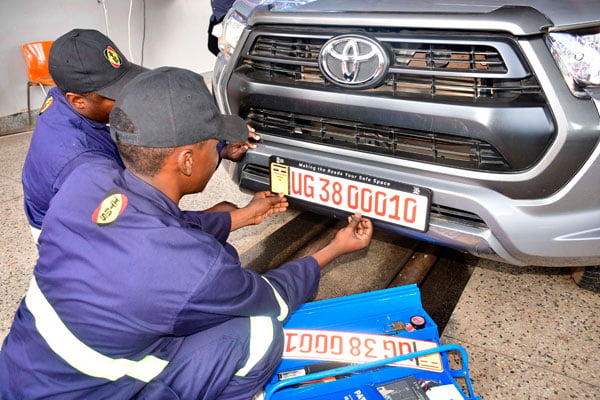Scrap new surveillance system, HRW tells Uganda
Tuesday November 14 2023

Mechanics fixing a new numberplate on a vehicle in Kampala, Uganda on November 1, 2023. PHOTO | DAILY MONITOR
Uganda’s new surveillance system, which allows the government to track the real time location of all vehicles in the country, undermines privacy rights, and creates serious risks to the rights to freedom of association and expression, Human Rights Watch said, urging government to scrap it.
On November 1, 2023, the government initiated the “Intelligent Transport Monitoring System”, reportedly to address national security issues. The authorities say it will build on the country’s existing traffic surveillance system with a network of surveillance cameras and mandatory cellular-network-connected tracking devices on all vehicles in the country.
“Uganda’s new transport surveillance system amounts to unchecked mass surveillance of all vehicles at all times, undermining the right to privacy for millions of Ugandans,” said Oryem Nyeko, Uganda researcher at Human Rights Watch.
Read: Uganda data miners to comply with privacy law
According to him, the government should focus on protecting its citizens’ rights instead of abusing them.
The rights body said government of Uganda has limited public scrutiny of the technical system, its capabilities and the contract with the Russian company delivering the project. Also, it has published no plans for oversight and human rights mitigation around the project.
Since 2018, the Ugandan government has progressively expanded its surveillance capacity after President Yoweri Museveni unveiled a “nine-point security plan” to respond to a series of killings of high-profile political and government figures by unidentified people riding on motorcycles.
Museveni’s plan included the introduction of electronic license plates, which he said would enable police to track down the owners of vehicles discovered to have been at crime scenes.
In 2019, the government procured $126 million worth of closed-circuit television camera (CCTV) surveillance technology from the Chinese telecommunications company Huawei to monitor public spaces across Uganda. In July 2021, the government announced that it had entered an agreement with the Joint Stock Company Global Security, a Russian-registered company, to set up the Intelligent Transport Monitoring System.
Read: Uganda installs system to track telco revenues
Both the government and the company will operate the system for the first 10 years, after which the company will hand it over to the government, the authorities said.
Ms Susan Kataike, the spokesperson for the Works and Transport Ministry, told Human Rights Watch that the new system will introduce new license plate recognition and surveillance, facial recognition, and traffic density cameras, which will “complement” an already existing network of CCTV cameras operated by the police.
As part of the system, all vehicle owners will, after February 1, 2024, be required to pay between Ush50,000 ($18.57) and Ush714,300 ($189.47) to register their vehicles for new plates that will have an attached sim-card-equipped device provided by the state-owned telecommunications company, Uganda Telecommunications Corporation Ltd (UTL).
The device will allow the government to track the location of all registered vehicles from the police national command centre in real time. Foreign vehicles temporarily in Uganda will also be required to install the tracking devices for the time they are in the country.
The system will collect data from UTL’s telecommunications network, as well as the network of a privately owned telecommunications company, increasing the number of corporate private actors with potential access to the real-time location of all vehicles in Uganda.
“This creates serious human rights and security risks, Human Rights Watch said,” the rights body said in a Tuesday statement.
"Several other countries use technology that allows for vehicles to be tracked when authorities can scan them. But Uganda’s sim-card-based approach that will allow the government to track vehicles in real time is novel,” the statement added.
Read: Kenya pushes for a regional cargo tracking system
The government has in the past used surveillance technology to track and arrest government opponents and critics. In 2020, the police confirmed that they used CCTV, facial recognition, and license plate recognition technology to track down and arrest alleged protesters in the period leading up to Uganda’s 2021 elections.
Human Rights Watch says it has documented the arbitrary arrest and unlawful detention of people alleged to have taken part in protests during this period.
“Uganda already collects and stores vast personal information including names, signature, photo, and fingerprints of nationals to register sim cards and national identity cards. A Kampala-based media organization, the African Centre for Media Excellence, said in a 2023 report that this mass data collection has created a climate of fear for journalists in the country and restricted their work. In August 2022, the government announced plans to include DNA and iris scan information to register new identity cards.”
Uganda’s Data Protection and Privacy Act of 2019 provides for collecting person data under the pretext of “national security.”
Both the Anti-Terrorism Act of 2002 and the Regulation of Interception of Communications Act of 2010 also provide for “lawful interception and monitoring of certain communications in the course of their transmission through a telecommunication, postal, or any other related service or system in Uganda.”
These provisions are reportedly broad and contrary to international law, which requires that any intrusion on the right to privacy, including gathering metadata or surveillance of communications content, must be strictly necessary and proportionate to protection of a specified state interest and clearly regulated in law on a non-discriminatory basis.
“The scale and rate at which the Ugandan government is increasing its power to collect and store information about its citizens is alarming,” Nyeko said, arguing that the authorities should focus on bolstering the protection of fundamental rights and freedoms instead of restricting them, and harmonize its domestic laws on limitations on the right to privacy with international law.